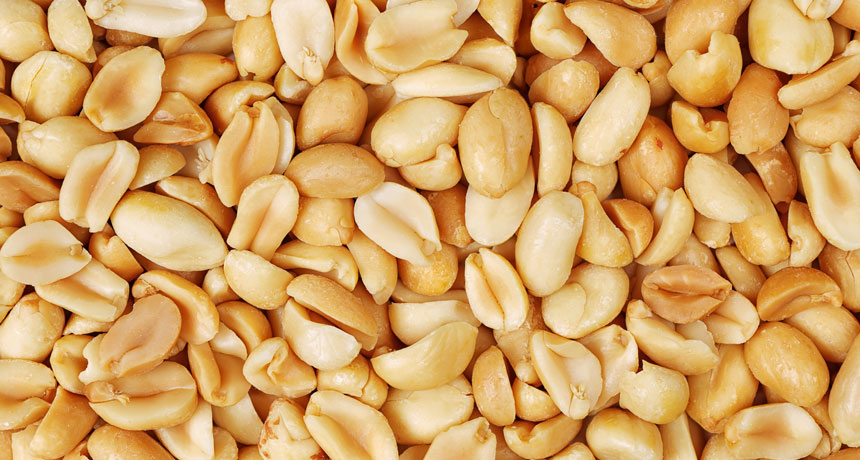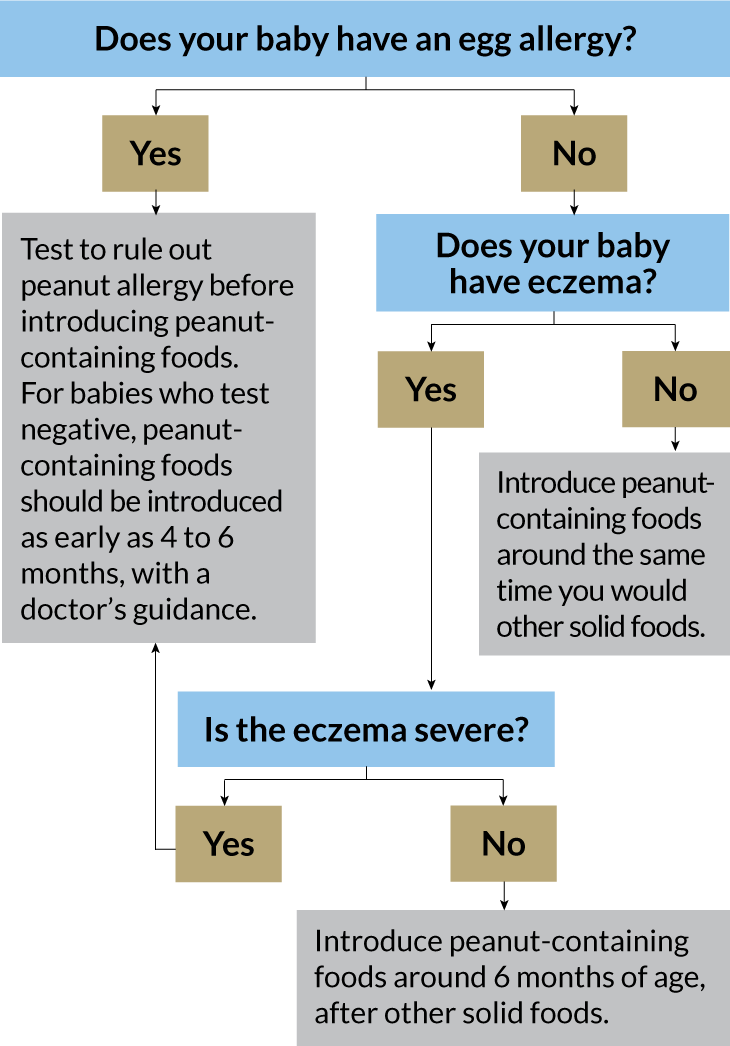Though complex, new peanut allergy guidelines are based on science

New guidelines state that foods containing peanuts are OK to introduce to babies as young as 4 to 6 months old — with certain caveats.
Morrison1977/iStockphoto
Six hours before I gave birth to my son, our labor and delivery nurse started choking.
The cause, we later discovered, was a jar of peanuts that my unsuspecting husband had cracked open for a snack. Our fast-acting (and highly allergic) nurse rushed out of the room and made it to her EpiPen in time. She was OK, to our immense relief, and we managed to not endanger anyone else’s life that night.
But, the scary incident made me want to keep my baby away from peanuts forever.
Don’t do that.
Instead, parents should feed (most) babies peanut-containing foods early and often, new guidelines from the National Institute of Allergy and Infectious Diseases recommend.
“We’re saying that if you introduce peanuts early, you’re going to have a very good chance of preventing peanut allergy,” says Alkis Togias, an allergist at NIAID in Bethesda, Md.
The guidelines, published January 5 in the Journal of Allergy and Clinical Immunology and five other journals, include pages of detailed advice and group kids by different risk factors.
All in all, it’s a lot to process. But in the history of official advice on how to feed your kids, peanuts have always been confusing. Two weeks ago, parents Googling “peanut allergies” might have found guidelines from 2010, which basically said there’s no good reason to avoid peanuts in the first year of life. Or a 2008 report from the American Academy of Pediatrics, which didn’t give a strong statement either way. Or the AAP’s 2000 recommendations, which had some kids avoiding peanuts until age 3.
Last week’s headlines hit upon the apparent contradictions, but the science has actually been steadily marching in one direction — towards peanuts — for years, Togias says.
In 2008, researchers noticed that Jewish kids from the United Kingdom were much more likely to have peanut allergies than Jewish kids from Israel. The reason seemed to be diet-based. Israeli babies usually begin eating peanut-containing foods around 7 months of age. U.K. babies typically wait until after their first birthday.
The results bucked conventional wisdom to delay feeding kids peanuts, and inspired a 2015 trial known as LEAP, for Learning Early about Peanut Allergy. In the trial, 640 babies between 4 and 11 months old with severe eczema and/or egg allergy were divvied up into two groups. One group ate peanut-containing foods. The other avoided them.
It was the first randomized, controlled trial to address the should-I-feed-my-baby-peanuts question. What researchers saw was remarkable: In peanut-fed kids, the incidence of peanut allergy dropped by roughly 70 to 80 percent.
“The results were so impressive that we felt it would be unethical to not come out with these guidelines,” Togias says.
The new guidelines offer different advice depending on certain conditions. For babies without eczema or egg allergies, the guidelines suggest that parents introduce peanut-containing foods around the same time as other solid foods. “There’s really no restriction,” Togias says.
Nuts and bolts of new peanut advice
In general, peanut-containing foods are OK for babies, unless kids have an egg allergy or severe eczema. For the full details of each recommendation, see the actual guidelines, or consult a doctor.

The advice gets tricky for kids with eczema, a skin rash that’s been linked to allergies.
Parents of babies with mild to moderate eczema can stick to the above plan, but peanut-containing foods should be introduced after other solid foods, around 6 months of age. (The allergists I talked to stress that babies should never eat whole peanuts, or even globs of peanut butter — both are major choking hazards.)
Babies with severe eczema and/or an egg allergy should be tested to rule out peanut allergy. If the test is negative, peanut-containing foods get a tentative green light. A doctor can help parents decide if the baby should be fed in the office, or at home with some instructions.
Repeat peanut-feedings is key, says pediatric allergist J. Andrew Bird of UT Southwestern and Children’s Health in Dallas. “Once peanuts are in the diet, they need to stay in the diet,” he says.
It’s unlikely that the United States will see the same drop in peanut allergy reported in the LEAP trial. But even a 50 percent reduction would be huge, Togias says. By his back-of-the-envelope calculation, the U.S. sees roughly 80,000 new cases of peanut allergy every year. “If we cut that in half, we’re saving 40,000 kids right away,” he says.
Still, allergist Katie Allen says the guidelines’ nuanced instructions risk complicating the message that peanuts are OK.
“There’s a lot of merit to these guidelines, but I’m a little worried that the general population will read this and say ‘I’m scared my child has a peanut allergy so I’m going to get him tested,’” says Allen, of Murdoch Childrens Research Institute in Victoria, Australia.
The skin prick test used for screening is not that reliable, she says. And a false-positive result could turn people away from peanuts unnecessarily.
Australia’s guidelines are more straightforward, Allen points out. They recommend that all infants be fed allergenic foods, including peanut butter, within the first year of life (around 6 months, but not before 4 months).
For me, that’s an easier message to digest. Already, Bird has picked up on confusion about the U.S. guidelines. “I saw a mom who said, ‘OK, now this is telling me that my peanut-allergic kid should be eating peanuts every day?’”
That answer to that is a big “no.” These guidelines aim to prevent peanut allergies, not treat them, Bird says.
If the core advice does get out there — to pediatricians, and allergists and parents — it may well keep (at least some) kids from having to grab an EpiPen after getting a whiff of peanut. And that’s something any parent could get behind.
Meghan Rosen is a staff reporter at Science News. Follow her on Twitter: @MeghanDRosen.







